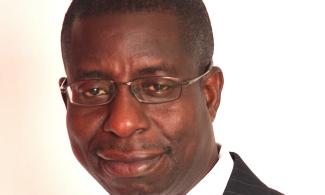
Everyone is hailing President Buhari’s first budget as an elected head of state. Everyone, it seems, except the bitter malcontents of the Peoples Democratic Party, better known by their rallying cry of “PDP? Share the money!!!” And quite some money-sharing they did for sixteen years, as the sheer cold-bloodedness of former National Security Adviser Sambo Dasuki’s free money madness has shown to the world.
Everyone is hailing President Buhari’s first budget as an elected head of state. Everyone, it seems, except the bitter malcontents of the Peoples Democratic Party, better known by their rallying cry of “PDP? Share the money!!!” And quite some money-sharing they did for sixteen years, as the sheer cold-bloodedness of former National Security Adviser Sambo Dasuki’s free money madness has shown to the world. From “armsgate” it has been more properly dubbed “Dasukigate, thus giving the scandal its deserving human face and helping to unmask the many other faces behind this one unforgettable sleaze among too many to count in the six-year calamitous governance of the luckiest president earth has ever known, Dr Goodluck Jonathan. As a poet and writer, I am besotted with metaphors but I find myself unwilling to join in the easy gate-ification of any of our unending series of shocking malefactions: Pension-gate, Oduah-gate, Ekiti-gate, etc. 
Why I recoil from this particular instance of the deployment of metaphor is not clear to me, but I suspect it has to do with the feeling that by the quick resort to linguistic externalization in the naming of our gratuitous self-brutalisation, we bring needless relativism into the matter. As if to say, You see, we are not peculiar; it happens even in the “civilised” world. The United States of America, for example, which gave us Watergate, the root-word for sacrilege and outrage. Something in me stubbornly insists on shunning any such consolation by maintaining the peculiarity of our country’s infinite love of disgrace. A love that may have to do mostly with official conduct, though that precisely is where our greatest undoing as a nation lies.
Which brings me back to my starting point: whether or not Buhari has with his first budget as a democrat laid the ghost of budgets almost wholly devoted to recurrent expenditure. Oh, yes, I have “recurrent corruption” in my title, but only as a last-minute concession to brevity. Even this early into revelations of the looting spree that characterized the Jonathan presidency, we can already agree that “recurrent expenditure” was just a euphemism for the astonishing fiscal banditry that characterized his budgets. For instance, the last presented on his behalf by his Pontius Pilate finance minister who preferred to be addressed by the self-inflating title of co-ordinating minister of the economy. Out of an aggregate expenditure of N4.3 trillion, the capital vote was N557 billion. In other words, in a four trillion naira budget, only half a billion could begrudgingly be allocated to capital projects, the very things we mean when we talk of development. Things like roads and bridges, railways, power, housing, fibre optic cables, schools and hospitals. According to BudgIt, the online public finance analytics group, the actual capital vote in the 2015 budget was N387 billion, and the figure of N634 billion given by Okonjo-Iweala in her presentation speech seemed to have included the Subsidy Reinvestment Program’s (SURE-P) vote of N245.5 billion. At any rate, the details only elaborate, needlessly, the unforgettable fact: that altogether the total 2015 recurrent expenditure of N3.9 billion represented a whopping 91 percent of the budget, leaving . . . well, a nice 9 percent to the things that can actually change our lives. To be fair, the 2014 budget had done a little better as President Jonathan allowed an incredible N1.1 trillion for capital expenditure, even if we did not feel its impact—perhaps due to the mad money syndrome that Dasuki’s mother-of-all-419-scams have made coldly clear to the world.
By comparison, Buhari’s proposed N6 trillion budget for 2016 has N1.8 trillion or 30 percent of the total budget sum earmarked for capital expenditure. Although that leaves the inordinately huge chunk of 70 percent for recurrent expenditure, it marks nevertheless an increase of about 300 percent from the 2015 budget allocation. One gets the feeling that but for inherited discrepancies, and the deep-rooted distortion of priorities that cannot be done away with in one fell swoop, Buhari would have started off with no less than 50 percent of the 2016 budget going to capital projects. This is evident in the fact that at precisely the moment of the lowest oil prices since the return to civil rule in 1999, Buhari has proposed the “biggest” budget estimate in Nigeria’s history. The sectoral allocations also point unmistakably to a gradual restoration of priorities, of a long-pined-for return to the proper sense of proportions: N396 billion, the highest single sector allocation, for education; followed by N296 for health, N294 for defence and N202 for transportation. Only the combined sectoral allocation of N433 billion for works, power and housing stands atop these figures.
I admit, it is rather too early to make any definitive statements about the Buhari administration. Still, given our recent history of very costly budgetary waywardness and fiscal irresponsibility, it is hard not to succumb to a strong feeling of hope and optimism despite the president’s preferred slow and steady (as opposed to fast and furious?) pace of bringing about the change he promised a much abused citizenry. For change to begin in earnest, however, the 2016 budget will have to score above 70 percent in implementation. And the 2017 budget must have a minimum of 50 percent capital expenditure vote. Then we might be able to speak of recurrent expenditure budgets as relics of our better forgotten recent past.